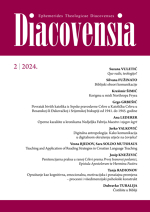Opraštanje kao kognitivna, emocionalna, motivacijska i ponašajna promjena – procesni i višedimenzijski psihološki konstrukt
Forgiveness as a Cognitive, Emotional, Motivational and Behavioural Change – A Processual and Multidimensional Psychological Construct
Author(s): Tanja RadionovSubject(s): Individual Psychology, Cognitive Psychology, Neuropsychology, Behaviorism
Published by: Katolički bogoslovni fakultet u Đakovu
Keywords: forgiveness; theories; measurement; physical and mental health; intervention models; psychological well-being; depression;
Summary/Abstract: In interpersonal relationships, people sometimes hurt one another, which often causes reactions of avoidance or revenge but also opens the possibility of forgiveness. Forgiveness plays a vital role in people's lives; it affects the overall health and quality of interpersonal relationships. The aim of the paper is a general presentation of insights in the field of the psychology of forgiveness. Forgiveness is defined as a cognitive, emotional, motivational, and behavioural change from negative to positive and as a processual and multidimensional psychological construct. There are several leading theories of forgiveness and measuring instruments for forgiveness. Research has established a positive connection between forgiveness and physical and mental health. Long-term individual processual intervention models focused on forgiveness are very effective and have found clinical application in psychoeducation and counselling. In conclusion, it is important to encourage positive social interactions and effective strategies in relationships, such as forgiveness.
Journal: Diacovensia: teološki prilozi
- Issue Year: 32/2024
- Issue No: 2
- Page Range: 335-353
- Page Count: 19
- Language: Croatian

